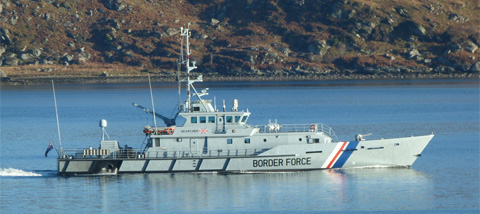New years bring both excitement and uncertainty and perhaps this year, more uncertainty than most: but, as criminologists have long recognised, probably nothing new by way of problems. There are several recurrent themes, almost laws, in criminology: one is that eve ry invention gives rise to a new crime which then has to be tackled by retro-fitting security – think drones. Another is that high-value crimes and even wars generally mimic the ways people and countries trade: think internet scams and cyber-threats.
ry invention gives rise to a new crime which then has to be tackled by retro-fitting security – think drones. Another is that high-value crimes and even wars generally mimic the ways people and countries trade: think internet scams and cyber-threats.
A third is that legal constraints and tariffs generate smuggling. Of course, smuggling hasn’t ever gone away: in recent years we have seen drug smuggling, because of the legal constraints on drugs; tobacco smuggling, because of differential tax rates; and, for the last 20 years, people smuggling has increased as a consequence of immigration restrictions.
However, it is only in the last 10 years that people smuggling has really shot up. Undoubtedly one of the main drivers has been the state of affairs in Africa and Syria. But another is that the various branches of the Italian Mafia were experiencing diminishing revenues from drugs so were on the lookout for new business. By happy chance for them, Africa and willing migrants were on the  doorstep of the southern Mafia branches, particularly the ʼNdrangheta who are based in the toe of Italy – with the result that they now earn more from migrants crossing the Mediterranean than they ever earned from drugs. It looks likely that it was the ʼNdrangheta who killed Daphne Caruana Galizia, the respected and out-spoken Maltese journalist who was busy exposing their wretched activities. (I had the pleasure of chairing Alex Perry’s session on his excellent book about the ʼNdrangheta at last year’s Ways with Words).
doorstep of the southern Mafia branches, particularly the ʼNdrangheta who are based in the toe of Italy – with the result that they now earn more from migrants crossing the Mediterranean than they ever earned from drugs. It looks likely that it was the ʼNdrangheta who killed Daphne Caruana Galizia, the respected and out-spoken Maltese journalist who was busy exposing their wretched activities. (I had the pleasure of chairing Alex Perry’s session on his excellent book about the ʼNdrangheta at last year’s Ways with Words).
Nearer home, we have recently seen a tiny flow of immigrants across the Channel but, although the ʼNdrangheta and others now have global reach, they may have difficulty maintaining a cross-Channel operation for long when they are so far from Calabria.
However, the ancient rules still apply. If there are tariffs between the UK and the EU, there will be smuggling. That has national  implications – for the number of Border Force cutters and staff at the ports of entry – and also a potential impact locally. Will Salcombe need a Border Force office and Customs House again, for instance? If not, as some ports will undoubtedly become target-hardened (as they say in the trade), this will inevitably tend to push smugglers towards ports which have little or no Border Force or Customs staff. I have already promised that these are Brexit-free pages, so will say no more.
implications – for the number of Border Force cutters and staff at the ports of entry – and also a potential impact locally. Will Salcombe need a Border Force office and Customs House again, for instance? If not, as some ports will undoubtedly become target-hardened (as they say in the trade), this will inevitably tend to push smugglers towards ports which have little or no Border Force or Customs staff. I have already promised that these are Brexit-free pages, so will say no more.
Comments are closed, but trackbacks and pingbacks are open.